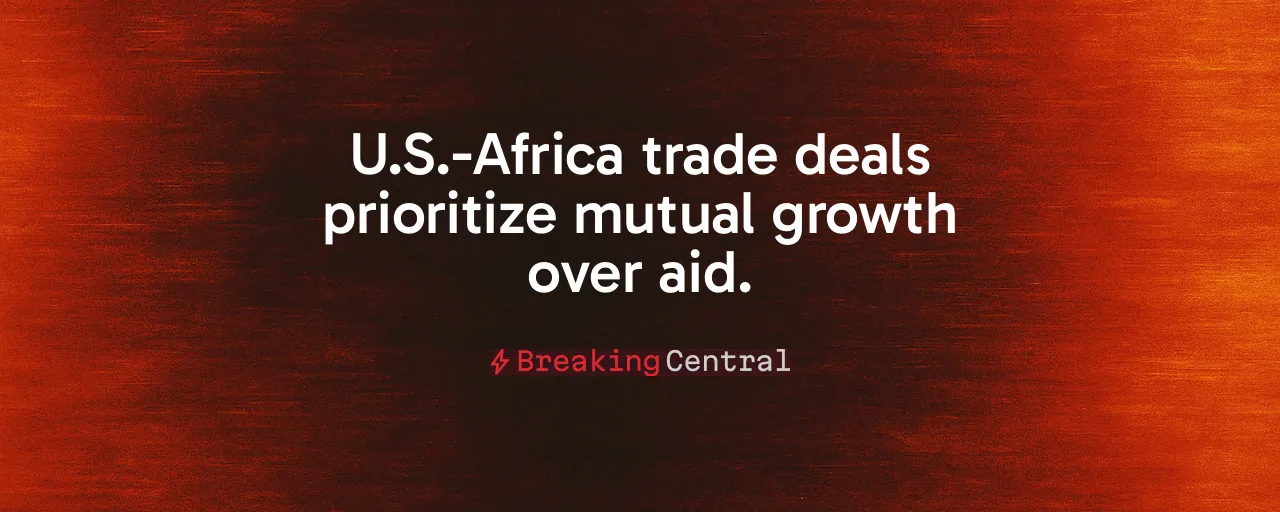A New Era of Trade Takes Root
The U.S.-Africa Business Summit in Angola last week delivered a clear message: America is doubling down on trade over handouts to build stronger ties with African nations. Over 2,700 leaders, including 12 African presidents, converged in Luanda, sealing $2.5 billion in deals that prioritize mutual prosperity. From grain silos to hydropower lines, these agreements signal a shift toward investment-led growth, aligning with a vision that values self-reliance and market-driven solutions.
This approach marks a departure from decades of aid-heavy policies. The Trump Administration's Commercial Diplomacy Strategy, showcased at the summit, emphasizes private capital and U.S. exports to create jobs on both continents. It is a bold stance, rooted in the belief that empowering African economies through trade strengthens global stability and counters the influence of rivals like China and Russia, who have long sought footholds in the region.
Big Wins for American Ingenuity
The summit's outcomes speak for themselves. A Florida-based consortium, Amer-Con Corporation, inked a deal to build 22 grain silo terminals along Angola's Lobito Corridor, backed by the U.S. Export-Import Bank. This project will bolster Angola's food security and streamline agricultural logistics, creating a model for regional self-sufficiency. Meanwhile, U.S. tech firm Cybastion partnered with Angola Telecom on a $170 million initiative to expand digital infrastructure and cybersecurity, equipping Angolans with training and tools for a modern economy.
Energy projects stole the spotlight. Hydro-Link, a U.S. energy investor, signed a $1.5 billion agreement to develop a 1,150-kilometer transmission line connecting Angola's hydropower to mineral mines in the Democratic Republic of Congo. This corridor will deliver 1.2 gigawatts of reliable electricity, powering critical mining operations and supporting energy needs across borders. These deals showcase American firms' ability to deliver transformative infrastructure while advancing U.S. interests in securing mineral supply chains vital to national security.
Why Trade Trumps Aid
For too long, U.S. policy in Africa leaned on foreign aid, often fostering dependency rather than growth. The summit's focus on trade reflects a different philosophy, as partnerships built on shared economic interests yield lasting results. Historical data backs this up. Studies on the African Growth and Opportunity Act (AGOA), launched in 2000, show that duty-free access to U.S. markets boosted African exports in textiles and agriculture, creating jobs without ballooning budgets. AGOA's benefits hinged on market access, demonstrating a focus on self-reliance.
The $2.5 billion in new deals underscores the power of private investment. Unlike aid, which can be siphoned off by corruption or mismanagement, trade agreements like those signed in Luanda tie success to accountability and performance. They also level the playing field for U.S. companies competing against state-backed firms from nations like China, which have poured billions into African infrastructure, often with strings attached. By prioritizing commerce, America fosters economic freedom and resilience, values that resonate deeply with its own principles.
Navigating Risks With Eyes Open
The path is not without challenges. Corruption, regulatory hurdles, and political instability in some African nations can derail even the best-laid plans. U.S. firms also face fierce competition from foreign investors offering cheaper, state-subsidized deals. The summit's success hinges on ensuring these projects move from announcement to reality, avoiding the financing delays that have plagued past initiatives. Robust oversight and clear metrics for U.S. ambassadors, tasked with facilitating deals, will be critical to sustaining momentum.
Another concern is the potential impact of U.S. tariffs. Recent protectionist measures, aimed at safeguarding domestic industries, could inadvertently raise costs for African exporters reliant on AGOA. Lawmakers balance national interests with the need to preserve trade benefits for African partners. Targeted exemptions for AGOA-eligible goods could maintain goodwill while protecting American workers, ensuring that commercial diplomacy does not falter under competing priorities.
A Strategic Edge in Global Competition
The summit's deeper significance lies in its geopolitical weight. Africa's vast resources, from critical minerals to agricultural potential, make it a battleground for global influence. China's Belt and Road Initiative has secured ports, railways, and mines across the continent, often at the cost of African sovereignty. Russia, too, has expanded its presence through security and energy deals. The U.S. response, exemplified by the summit, leverages private-sector innovation to offer African nations an alternative, partnerships that respect their agency and prioritize mutual gain.
Projects like the Ruzizi III hydropower initiative, where U.S.-based Anzana Electric Group secured a stake, illustrate this strategy. By delivering reliable energy to 30 million people in Rwanda and the DRC, the project fosters stability and economic integration, reducing reliance on adversarial powers. Similarly, the West Africa LNG terminal, backed by the U.S. International Development Finance Corporation, positions American energy expertise as a cornerstone of African industrialization. These efforts secure supply chains and allies, reinforcing America's global leadership.
Building a Legacy of Prosperity
The Luanda summit sets a high bar for U.S.-Africa relations. Its $2.5 billion in deals proves that trade, not aid, can unlock Africa's potential while advancing American interests. By investing in infrastructure, energy, and technology, the U.S. is helping African nations build economies that stand on their own. This approach aligns with a vision of individual enterprise and accountability, values that have long defined America's economic success.
Sustaining this momentum requires vigilance. Policymakers streamline regulations, hold partners accountable, and ensure U.S. firms are not undercut by foreign competitors. Congress faces a pivotal moment with AGOA's 2025 expiration, an opportunity to modernize the program with reciprocal commitments that deepen trade ties. The stakes are clear: a prosperous Africa, partnered with America, strengthens both regions against global uncertainties.
As the dust settles on Luanda, one truth stands out. The future of U.S.-Africa relations lies in empowering people through opportunity, not dependency. These deals are more than contracts; they are a blueprint for a world where free markets and shared ambition drive progress. America's leadership in this arena is strategic, and it is a testament to the power of economic freedom.
